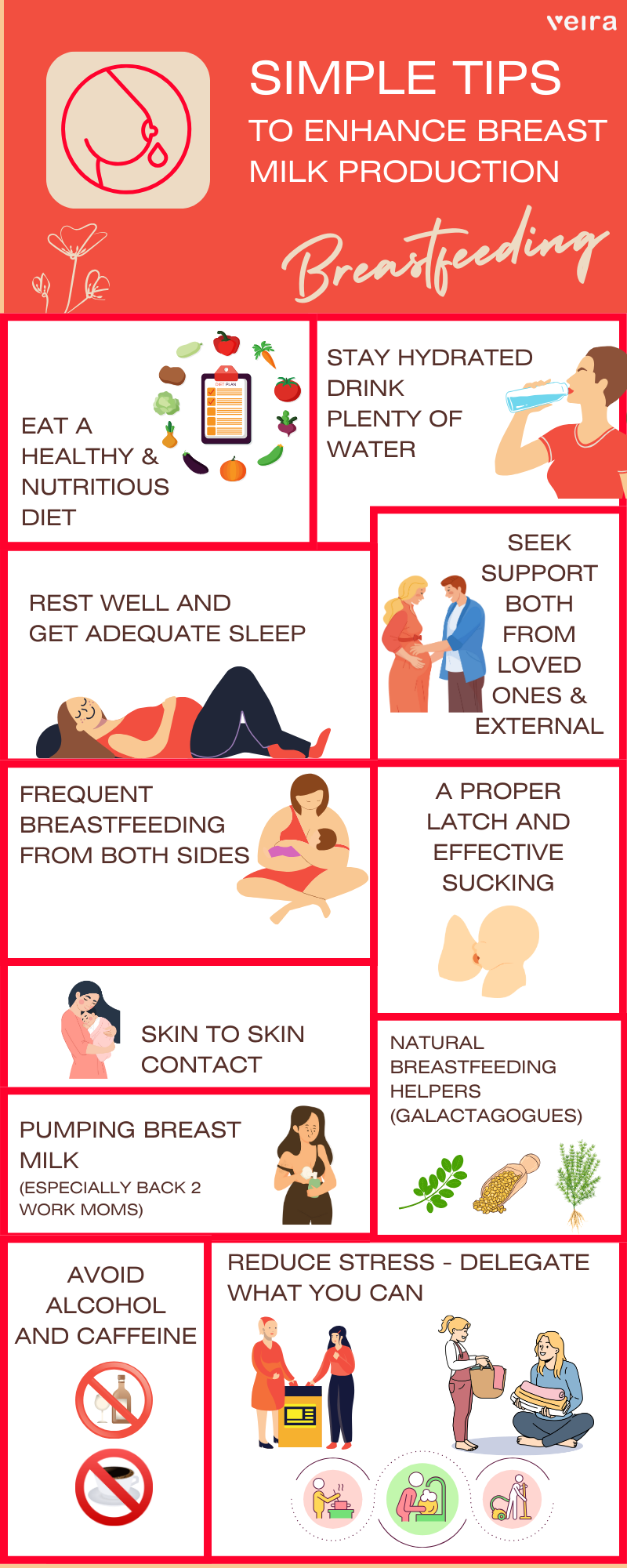Introduction
Every drop is a promise of life, nourishment, and a deep bond. The magic of breastfeeding goes beyond the visible, into a realm where mothers and babies communicate in whispers and warmth. While the journey of breastfeeding is unique and multifaceted, it’s no secret that the initial weeks, especially for first-time moms, can be filled with anticipation, questions, and even doubts.
Breast milk is a potent blend of nutrients and antibodies, tailored perfectly to the needs of the newborn. This elixir not only nourishes but also fortifies the baby against diseases, shaping their future health. It’s this profound significance that makes the concern of adequate milk production resonate deeply with many new mothers.
In this blog post, you will uncover strategies to enhance breast milk production and ensure a fulfilling breastfeeding journey for both you and your baby.
Eat a Nutritious Diet:
For a robust milk supply, a mother’s diet is crucial. The energy and nutrients derived from food directly influence the milk’s quantity and quality. Hence, including a variety of milk-boosting foods in your daily regimen can make a noticeable difference.
- Whole Grains: Oats are especially beneficial. They’re not only easy to prepare and consume but also promote milk production as a known galactagogue.
- Green Vegetables: Spinach, broccoli, and fenugreek leaves are rich in calcium, iron, and folate. Their beneficial properties can aid in enhancing milk supply and improving its quality.
- Nuts and Seeds: Almonds, sesame seeds, and flaxseeds are particularly beneficial. They’re packed with essential fatty acids which can elevate the richness of the milk.
- Proteins: Lentils, beans, and lean meats ensure that you get a steady supply of protein, which is crucial for the synthesis of breast milk.
- Fruits: Papaya and apricots have certain enzymes that support lactation. They are also rich in vitamins and minerals that can enrich your milk.
- Dairy: Including yogurt, milk, and cheese can offer a direct source of calcium and beneficial bacteria which can be good for both the mom and the baby.
By diversifying your diet and including these power-packed foods, you’re not only ensuring optimal milk production but also passing on essential nutrients to your baby, promoting their overall growth and well-being.
Drink Plenty of Water:
About 90% of breast milk is water, emphasizing the importance of hydration. Aim for at least 6 to 8 glasses of fluids daily, inclusive of water, milk, juice, or tea. A useful tip is to have a glass of water during each nursing session to stay consistently hydrated.
Stay Hydrated with:
- Water.
- Coconut water.
- Herbal teas like fennel and fenugreek.
Fresh fruit juices without added sugars.
Rest Well:
Rest and recovery play a crucial role in milk production. While finding ample rest can be a challenge for new moms, grabbing short naps when the baby sleeps can be beneficial. A well-rested body is more equipped to produce a consistent milk supply.
Restful strategies include:
- Co-sleeping for fewer disturbances.
- Using baby monitors.
- Ensuring a dark and quiet environment.
Manage Stress Levels:
Breastfeeding can be overwhelming, and stress can impact milk supply. Embrace relaxation techniques such as deep breathing, mindfulness and visualisation, walks in nature, light exercises, support from loved ones or even a chat with a close friend. Prioritizing self-care and reducing stress can indeed boost your milk production.
Helpful techniques are:
- Meditation and yoga.
- Reading or engaging in hobbies.
- Conversations with close friends or family.
Delegate What You Can:
Juggling household chores and caregiving can be draining. By delegating tasks to family or considering hiring postpartum help, you can prioritize breastfeeding, ensuring a consistent milk supply.
Alleviate your load by:
- Asking family members to assist with chores.
- Hiring temporary help.
- Using online services for grocery or meal deliveries.
Breastfeed Often:
Supply and demand play a crucial role in improving breast milk supply for lactating mothers. Breast milk production is a dynamic process that is regulated by a feedback mechanism within a woman’s body. The more a baby breastfeeds or the more milk is expressed from the breasts, the more milk the body will produce to meet the demand. Milk production starts when milk is removed from the breasts. This makes frequency (how often the breast is emptied) the key to increasing supply. To ensure a healthy milk supply, it’s important to breastfeed your baby frequently. Aiming for at least 8 to 12 nursing sessions daily can stimulate consistent milk production. Frequent nursing helps the body recognize the demand for milk and respond accordingly.
NOTE: In the first few days after giving birth, a mother’s body produces colostrum, a concentrated and nutrient-rich form of breast milk. As the baby nurses and stimulates the breasts, this initial milk production increases. Frequent breastfeeding during this time helps establish the milk supply.
With these practical steps you can increase your breast milk supply within a matter of days!

Get the basics right:
Learn about proper latching, breast massages to avoid engorgement, feeding positions, accessories that make breastfeeding more comfortable and how to recognise signs of potential problems early.
- Make sure that your baby is positioned correctly at the breast. If breastfeeding is uncomfortable or painful, readjust and start again.
- Another thing that can affect milk supply is latching. A proper latch and effective sucking by the baby are essential for efficient milk removal. Poor latching or positioning can prevent the baby from getting enough milk from your breast, and can lead to reduced milk transfer, which may result in a decreased milk supply over time.
- Skin-to-skin contact with your baby, also known as kangaroo care, can help stimulate milk production. Holding your baby skin-to-skin promotes bonding and encourages the baby to nurse more effectively.
- Use accessories such as feeding pillows to help make breastfeeding as comfortable for you as possible.
- Apply nipple creams if needed.
Pumping:
Check Out Some Natural Breastfeeding Helpers (Galactagogues):
Some mothers may consider using medications or herbs to increase milk supply if they are experiencing low supply issues. A bowl of oatmeal a day is considered a traditional milk booster. Many natural health practitioners also recommend herbal remedies like fenugreek and wild asparagus to boost breast milk production. However, while these natural helpers can be beneficial, it’s crucial to proceed with caution. Before taking any new supplements, ensure you’re not allergic and be aware of potential side effects. It is always advisable to check with your baby’s pediatrician before considering any supplements.
Consider:
- Fenugreek tea.
- Wild asparagus or Shatavari.
- Moringa leaves.
- Consult with your healthcare provider before taking any supplements.
Work With a Lactation Consultant:
Every woman’s body is different, and individual milk supply can vary. If you have concerns about your milk supply or experience ongoing issues, it’s essential to seek guidance from a healthcare professional or a certified lactation consultant. An experienced professional will be able to offer invaluable insights, personalized advice and support – from teaching effective breastfeeding techniques to making subtle changes in the baby’s latch or positioning, making a significant difference in your breastfeeding journey.
They can offer:
- Personalized feeding techniques.
- Solutions for common problems.
- Dietary recommendations.
Things to Avoid That Decrease Milk Supply:
There are different things that can get in the way of the establishment of a healthy breast milk supply.
- Birth control pills during the initial six weeks after the baby is born, can make it difficult to make breast milk.
- Other factors like consuming too much caffeine, drinking alcohol, or smoking can interfere with the amount of breast milk.
- Stress and poor diet can impact milk supply adversely.
- It is also important to keep your doctor informed about your breastfeeding before starting any new medications. Similarly if going for any beauty or spa treatments.
Conclusion:
Many new moms worry about ensuring their baby is getting adequate milk and nutrition. But as long as you are breastfeeding often and the baby is showing positive signs of getting enough breast milk, you – as a new mom – are doing great. So try not to let fear and insecurity sabotage your confidence. It is also important to understand that the decision to breastfeed or not breastfeed is a personal choice. As there is no right or wrong answer to this approach.
If you want to increase your breast milk supply, we hope the above-mentioned tips will provide you with adequate support and be helpful. And don’t forget to talk to your doctor or lactation consultant to navigate the right track to establishing healthy breastfeeding.
Empower Your Breastfeeding Journey with Veira Life
As you navigate the intricate path of breastfeeding, understanding and optimizing your breast milk production becomes paramount. Veira Life stands by you in this special phase, ensuring you’re well-equipped and supported.
How Veira Life Enhances Your Experience:
Insightful Resources: Delve deeper into topics like breastfeeding with our structured prenatal and postnatal classes. Each module is packed with resources tailored to offer clarity and confidence. We have a whole module dedicated to Breastfeeding which guides you on how to establish breastfeeding, continue it successfully through changes, manage the challenges with confidence and also provides you tips on what accessories (breastfeeding bra, pillow etc) can add to your comfort through your breastfeeding journey.
Expert Guidance: Every mother is unique, and so are her challenges. Our Veira Coaches are certified doulas, midwives, and lactation counselors. They have years of experience in helping families through their pregnancy and postnatal challenges and are passionate about their work. They are dedicated to offering you personalized advice. They understand the nuances of breastfeeding and are ready to help you conquer any hurdles.
Holistic Approach: Beyond the physical aspects of breastfeeding, emotional well-being plays a crucial role. Our coaches provide compassionate, holistic support to ensure you’re mentally and emotionally fortified.
Continuous Care: From initial breastfeeding concerns to mastering the process, Veira Life is with you at every step. We aim to make your journey smoother and more informed.
Feeling uncertain or seeking more insights on breast milk production? Connect with Veira Life today and let us enhance your breastfeeding experience.
FAQs
Milk production begins when your baby suckles, signaling the brain to release hormones, prolactin, and oxytocin. Prolactin triggers milk creation in alveoli, while oxytocin aids milk release through the ducts.
A woman’s ability to produce breast milk is directly related to her breastfeeding or pumping habits. Individual experiences differ; some sustain lactation long-term with consistent stimulation.
A woman generally produces around 25-35 ounces of milk in a day. This amount may vary among individuals. It’s best to plan your pumping times based on what suits you and your baby.
Low milk supply may result from insufficient milk removal, often due to breastfeeding or latching issues. Other causes can include medical conditions and stress. Consult a lactation consultant or healthcare provider if concerned.
Yes, pumping more often can boost your milk supply. Try to pump both breasts for 15 minutes every 2 hours for 2-3 days. However, pumping for more than 30 minutes often doesn’t help much.







